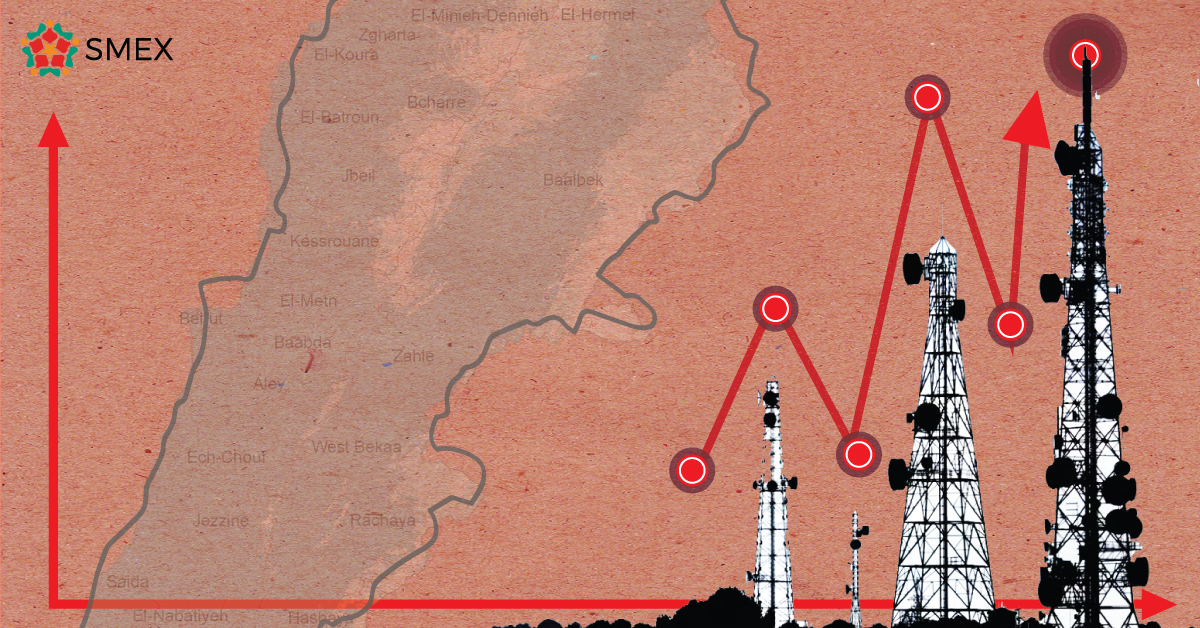Internet service providers are planning to increase end-user subscriptions from around USD 10 to USD 25 for a 5 Mb-speed internet. This decision comes after the Ministry of Telecommunications proposed a decree to raise internet subscription prices by provider Ogero, the backbone of internet and telecom services in Lebanon. Subscribers will be charged seven times the current price, i.e., the cheapest subscription fee of LBP 60,000 for 80 Gb will become LBP 420,000.
Robert Saab, President of the Internet Service Providers Association of Lebanon, told SMEX they still haven’t hiked the prices, but it’s on the table. “An E1 subscription line will increase five times from LBP 475,000 to over LBP 1,300,000 per month, plus a fixed fee of LBP 500,000 for every subscriber,” Saab added. He said they are still in talks with the Ministry of Telecommunications to lower the fixed fee “to prevent a price increase for the end-user.”
The Ministry’s decision, if it comes into effect, proposes that internet service providers should cover the LL 500,000 fixed fee for every subscriber. In Lebanon, the internet reaches end-users through Ogero, its official, legal contractors, and a third private (and illegal) network partly run and sustained by the official providers.
As such, the Ministry of Telecommunications doesn’t have a definite number of users subscribed to private providers. In this case, these providers can specify an inaccurate number to the government, and refrain from paying for the undeclared users, despite charging them the extra LL 500,000.
Telecom Minister, Johnny Corm, had proposed that Ogero acquire illegal internet networks in return for maintenance services for the owners of those companies, an option still under negotiation.
Despite companies not declaring a clear number of subscribers, Saab says that the Association (excluding major companies such as Cyberia, IDM, and TerraNet) “have started providing the Ministry with monthly reports on the numbers of customers since Decree 4452 was issued in July, giving the Ministry a general idea of subscribers that are not official networks such as DSL and FTTP and information transmission networks.”
Internet service providers had started charging subscription fees in dollars last April. Now they’re looking into raising the prices again to cover maintenance costs in dollars. “The majority of our companies rely on wireless networks and require maintenance regularly, in addition to the installation and maintenance of batteries and solar power systems to ensure the continuous functioning of the networks. These are expenses we pay in fresh dollars,” Saab explained. “If we don’t charge in dollars, we’d go under and there would be no internet in the entire country as there is no alternative to Ogero services.”
“The citizen bears the weight of maintenance and other fees,” according to an telecom expert who preferred to remain anonymous. “The Lebanese state and companies like Ogero are taking advantage of people’s need for the internet to raise their prices in an already non-competitive sector.”
The source ponders why internet service providers are discussing subscription price increases even before the ministerial decree is issued: “Are they planning on turning Ogero into the provider of international capacity only, while private companies become the internet providers of all subscribers?”
No Plan? Raise Prices!
Economic journalist, Imad Chidiac, told SMEX that “the government and Ogero are hiking prices to secure enough money for salaries decided upon by the parliament in its session on June 20.”
For instance, in return for the increase in landline subscription fees from LBP 9,000 to LBP 200,000 a month, the subscriber gets one thousand “free” minutes of local calls. According to Chidiac, this means “they will charge users the money in advance.”
The draft decree did not include any study or plan in exchange for the increased subscription prices for Ogero’s landline and internet services. Chidiac points out that “they’re increasing the dollar price for one minute to LBP 26,000, meaning they want to hit a specific revenue that reaches LBP 15,000 billion, the equivalent of USD 165 million.”
These prices are subject to an additional increase, according to Chidiac, “because the government and its ministries consider they have a leeway to push the exchange rate all the way to the Sayrafa rate” (LBP 82,600 per USD, compared to LBP 93,100 per USD in the free market).
Chidiac believes that Ogero prices will not reduce the number of users, but “the price hike will cause more people to subscribe to Ogero’s services because they would be cheaper.”
Saab affirmed that This increase in USD will push many people to forgo their internet subscription or reduce their service bundle, wondering whether the government “would want to widen this gap between them and Ogero, whose subscriptions will be much cheaper.”
Increasing prices without any improvement in services could lead many to switch providers. Previously, many canceled their subscription to EDL (Électricité du Liban) when prices increased with barely two hours of electricity per day.
“These superficial solutions, without any strategic plan, will deepen the gap between quality and prices, restricting people’s access to the internet—a right that the government must guarantee,” the telecom expert added. “Will people tolerate these hikes? How many will cancel their subscriptions?”



